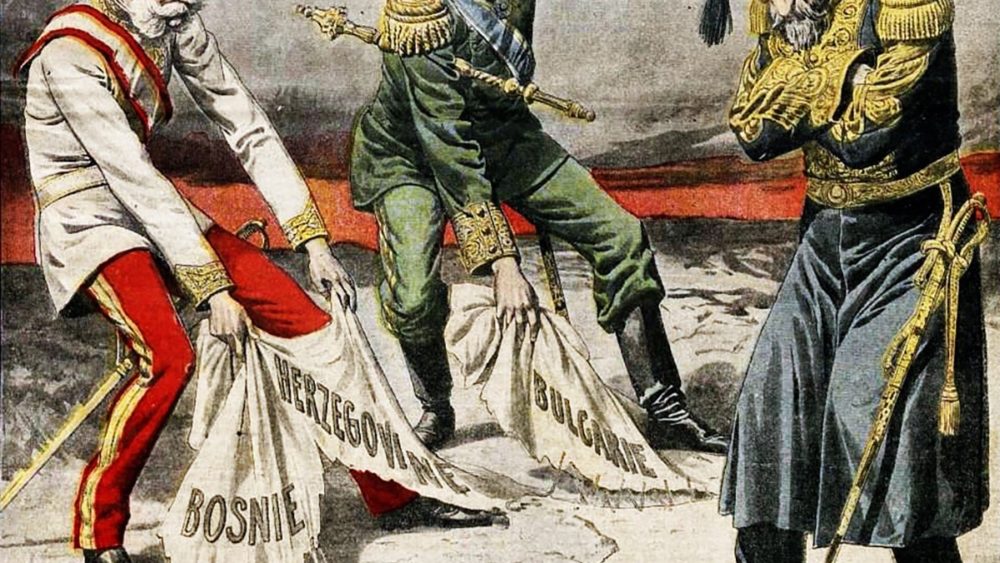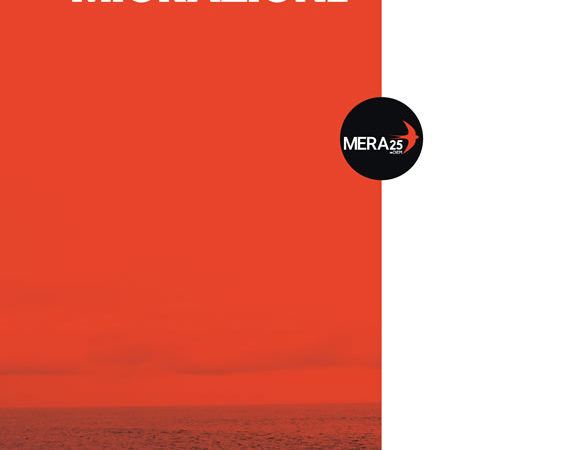Diem25, though a very young social movement, is still very weakly represented in south-eastern Europe: that’s a fact. Of course if one likes to complicate things, it might be challenging to define at first what exactly “South-Eastern Europe” is and what holds it together. Should we call it “the Balkans”? Well let’s not linger too long over terminologies and turn to what was once bluntly called “European Turkey” as depicted in masterly fashion in this 1908 edition of Le Petit Journal.
Before diving into Balkan issues and their current state of affairs, it is worth quoting Maria Todorova, quoting in turn from “Imagining the Balkans“, by the Afro-American sociologist and civil-rights activist W. E. B. Du Bois, as he pondered the florid “semi-colonial” status of the region:
The issue of the Balkans’ semicolonial, quasi-colonial, but clearly not purely colonial status deserves closer attention. Admittedly, the categories of colonialism and dominance or subordination can be treated essentially as synonyms. For W. E. B. Du Bois, the legalistic distinction between colonized and subordinate was ephemeral: “[I]n addition to the some seven hundred and fifty million of disfranchised colonial peoples there are more than half-billion persons in nations and groups who are quasi-colonials and in no sense from free and independent states.” The designation “free states” was a fiction that disguised a reality of oppression and manipulation: “In the Balkans are 60,000,000 persons in the ‘free states’ of Hungary, Romania, Bulgaria, Yugoslavia, Albania, and Greece. They form in the mass an ignorant, poor, and sick people, over whom already Europe is planning ‘spheres of influence’.
That should explain to us to some extent why in states like Hungary, Romania and Bulgaria (“happily” members of the European Union), or Albania, all of them representing the utmost embodiment of European internal colonization and effective deployment of neo-liberal policies, progressive social movements like Diem25, fiercely fighting exactly against these afore-mentioned scourges, are scarcely represented.
The one exception to this list, evidently not in the sense that it could withdraw itself from the austerity measures “recommended” to its government by the EU establishment, but to the extent that there Diem25 could find fertile soil, is Serbia. Serbian Diemers were crushed so to speak between many different ideological tectonic plates. One of them was the “leftist epiphany” existing in their country which means that some disillusioned intellectuals have started looking at left-winged ideas in a more affirmative way. There are many reasons why public opinion was reluctant to embrace this “political left”. Just to refer to some of them: it is worth mentioning that Milosevic’s clique, made up of all sorts of business tycoons, and responsible for Serbia’s economic plight during and after the Milosevic era, was always associated with the “progressive parties”. Parties including the Labour Party, Association of Free Syndicates of Serbia, Social-democratic Union and even the Democratic Party, member of the “Pink” International, were active (especially the Democratic Party) in turning Serbia into a heaven for a few rich people and a hell for the many who were poor. Furthermore, the workers’ syndicates, inherited from the Yugoslavian era, were used indiscriminately to silence the working class. Trade union struggle was damped down in the 1990s and showed weak signs of life until 2009. Why? Because the world economic crisis, known in Serbia as SEKA (Svetska Ekonomska Kriza) had also reached these shores, so to speak.
So, what happened was a hard and sobering blow for the working class: workers started to form their own unions and, with considerable difficulty, strove to defend their independence from the state authorities. All this, combined with the non-EU status of Serbia, left progressive and social activists in a sort of desperate plight. They became small, disunited and in serious internal dispute over one basic question: Who would be the leader of the Left? Of course, they massively omitted one major challenge. Even if, by some stroke of luck, they had become a political force in our country, who would come to their aid? The only force that can give them the support they need is the pan-European movement of leftists and progressives in general (not to be mistaken with today’s Serbian “progressive” regime) and the only such movement is DiEM25.
In Hungary there is not much of a ‘Left’ – the idea has been largely discredited by 45 years of Soviet socialism. It has been noted that there is a political difference to be found in a country that had Soviet troops (such as Hungary) compared to those that did not (such as Yugoslavia) – this is an important observation.
The effect of this in Hungary is that the opposition to the present right-wing government comes only from neo-liberal liberals and also from the anti-neo-liberal fascist right – few in Hungary would call themselves ‘democratic left’ today (how that would be defined from a DiEM25 perspective, anyway?). A new democratic ‘Left’ has never emerged in Hungary after the changes of the late 80s/early 90s.
We do not have answers for how to ‘fix’ this reputation or attitude other than to say it needs to be acknowledged by leftwing activists in western Europe as a fundamental feature of ‘eastern’ European politics. Ignoring this or understanding it by invoking some kind of misplaced ‘Soviet nostalgia’, or glossing over it completely, does nothing to help.
Before examining our four case studies, Hungary, Romania, Bulgaria and Serbia, let’ s quickly recall the past two decades in those countries. One fundamental issue dissociates Hungary, Romania and Bulgaria, on one hand side and Yugoslavia, later Serbia, on the other: the former three countries “won” the Second World War thanks to the Soviet Union, whereas last one did so thanks alone to their own partisans. This was a crucial factor in the political divisions that until today, have kept these countries apart. Mainly in Romania and Bulgaria the external diplomatic mission, regardless of political direction, whether rightist or leftist, was always committed to subordinating its local and national interest by seeking out “strategic” international partnerships with the world’s great powers, whether this was the Third Reich, the Soviet Union, or NATO. Serbia, by winning the war on its own and by deploying its own “third way” communism, was armed with the self-confidence and pride, which would later decay soon enough into nationalism and internal struggle.
The 1990’s
Let’s start this short historical memento with the 90s. Whereas in Hungary, Romania and Bulgaria, those times were naively perceived as “times of hope and liberty”, in Serbia, at the time part of Yugoslavia, things escalated very tragically. In brief, there was the initial crisis, which gave way to nationalism, then war, accounting for 100, 000 victims and millions of refugees. Meanwhile, Bulgaria and Romania were exonerated from this flagellum, mainly due to their ethnic “purity”, given that their few minority populations were not scattered all across the whole country and instead “confined” to a few regions, Hungarians in Romania, in Eastern Transylvania and Turks in Bulgaria, and in the Rhodope Mountains.
It is worth remembering in this context the bitter historical irony that during the NATO bombings in the Federal Republic of Yugoslavia (consisting of Serbia and Montenegro), as an aftermath of the “Yugoslavian wars”, they basically bought their NATO and then subsequently EU, entry tickets, by opening their air space to NATO airplanes. This was a modern version of Metternich’s “Divide et Impera”, working to perfection. Among others common ties between Romania and Bulgaria one can should also mention the demographic, but also psychological, ubiquity of the communist-inherited secret police. Those were the ones orchestrating the “coups d’états” in the early 90s, and after the fall of Iron Curtain, they were the cowboys of the new capitalism, eastern-style.
It is worth having a look at the numbness of mainstream civil society in those countries, in comparison to “western” social unrest. Whereas “in the West” G20 summits (think only of what happened a few months ago, in Hamburg), American military invasions, mostly in Iraq, or in Afghanistan or trans-Atlantic commercial deals like TTIP and CETA, have ignited huge protests among civil society while south-eastern Europe has remained seemingly inured. However “corruption”, obviously local corruption, has been the hot potato in that part of the world. In all these afore-mentioned countries the locally corrupt oligarchy has prompted “the demos” to take to the streets. This says a lot about the social chasm there. It is also highly interesting how corruption has become a key topic on their political agenda and not a few times has served to fuel the careers of populists – but this could be the subject of another paper, if not an entire book.
The explanation for DiEM25 being unfortunately unable till now to find fertile soil in this part of Europe, can also be found in the different mainstream civil society perceptions of some key aspects of its progressive agenda. Let’s examine three of these aspects:
Democracy
Probably it is worth ab initio quoting Oscar Wilde‘s bitter joke about democracy: “it is impractical and it goes against human nature, this is why it is worth carrying out“. One can hardly find another place in Europe where collective thought is committed to the first part of this sentence. Mainstream civil society is simply lethargic vis-à-vis grass roots democracy, or “democracy from below”, one of the main endeavors of DiEM25. A feeble and sometimes too centralized administration has turned people away from democracy, who were already convinced that their voices don’t count. An interesting phenomenon to note is that the massive brain-drain of Balkan “elites” has given birth to a new type of social mutant and also social-class: the “corporate proletariat”. The newly established white collar social tier has developed its own sense and ideas about democracy, and advocates shifting power from the former rusty “socio-communist” oligarchy to a new “liberal technocracy”.
Yanis Varoufakis says that a fundamental flaw of the EU is that it started out not as an institution based on democracy and human rights, but as an economic cartel of the Benelux countries. Well, on this side of EU Europe a fundamental flaw of the EU is that countries were brought into it in a rushed manner without our newly democratised cultures (‘the demos’) fully grasping the meaning of joining.
Also, in Hungary for example, the threshold for voter participation in the referendum was lowered from 50% to 25% for the purpose of pushing Hungary into the EU. This is not an argument for being against the EU, but it is important to know that normal democratic means were not deployed from the beginning. Therefore, sadly, it can be accurately said that Hungary did not join the EU in a normal democratic way. The implications of this are still felt today with the present government’s right wing populist attacks on the EU as ‘anti-democratic’ while inciting the population to hate the bogeyman called ‘Brussels’.
Social welfare (New Deal)
If in France changes to the legislation, some years ago, that slightly increased the pension age were sufficient to ignite the streets, almost culminating in civil war, in Romania and Bulgaria EU political dictates consisting in severe social and public expenditure cuts, in 2008-2010, were met with an astonishing passivity by “civil society”, civil anomie and the very same thing happened in Serbia. The accepted economic mantra for the last two decades has been to sell off human and natural resources at practically no cost whatsoever to the “free market”. The price paid for their economic “uncompetitiveness” has been a huge demographic decline and the loss of every surviving hope in the ability of state institutions to balance brutal social inequalities, guarantee social justice or encourage participative democracy.
Migration
There are bitter jokes in Romanian and Bulgarian to the effect that there are more Bulgarian and Romanian doctors in France than in their countries of origin. Sadly this is true. As borders opened and the labor market started to liberalize, all hopes and prospects started to look towards the west. One problem was that they did not look at all between themselves, Bulgarians to Romanians, Romanians to Serbians …
Two aspects are important to underline here, apart from the fact that south-eastern Europe was for decades, and still is, that inexhaustible source of both cheap labor as well as highly skilled workers, necessary to build the “digital economy” of the future.
One point is that by demographically growing to such an immense extent (there are hundreds of thousands of migrants from each of the three countries, Romania, Serbia, Bulgaria, in almost all big western European countries), their diasporas have developed their own cultural consciousness. On one hand, they still live to a great extent in a cultural ghetto, not being and also not wishing to be assimilated and on the other, they have transformed themselves into a new caste of lecturers or supervisors in their adopted countries, having now “learned better how things should be done.”
A second aspect concerns the reluctance, if not hatred sometimes shown towards recent refugees fleeing from conflict in the Middle East. Serbia, Romania and Bulgaria were far more moderate in their resistance than the Visegrad countries, mainly out of their obedience and submission to the EU establishment, their political class unwilling to upset “the big daddies” at Brussels while also concerned not to lose too much social capital at home. This is working Serbia, not yet an EU member, but humbly negotiating its entry ticket. The latter two countries are meanwhile securing their membership by almost going down on their knees to beg.
Conclusion:
So, to conclude, let us hope that this text isn’t just that – “mrtvo slovo na papiru” as they say in Serbia or “dead letter on the paper” aka something that has no value. This text is a call to our fellow Diemers from all over eastern Europe, from Tallinn to Tirana and from Ljubljana to Kiev, to join us in creating this platform that will bring us closer together, not only through our shared experiences, but also bring us closer to other Europeans with different histories in the west, south and north.
Carpe diem!
DiEM25 members from Bucharest, Sofia, Budapest and Belgrade.
Volete essere informati delle azioni di DiEM25? Registratevi qui!




